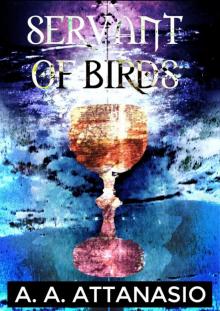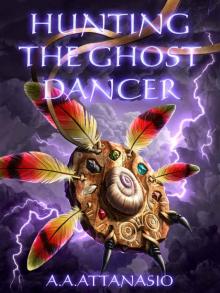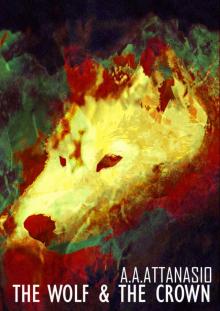- Home
- A. A. Attanasio
Wyvern Page 3
Wyvern Read online
Page 3
Mosquitoes swarmed, and he longed for the root and mud paste that the tribal peoples used to ward off biting insects. He passed tilted, man-high ant towers, blood-mottled flowers wide as a full stride and stinking of dead meat, and a field of pearl-sized mushrooms.
Deep in the jungle where night lingered in chambers of chilled air, Batuh found Jabalwan sitting on the ground in the umber shadow of a massive tree gilled with fungi. "Z-z-zhut!" the sorcerer called as Batuh passed by without seeing him. The sound so perfectly mimed the twang of a bowstring that Batuh flung himself to the ground and rolled in the black, fusty duff.
"You want to be chief of the Tree Haunters?" The sorcerer laughed.
Batuh scrambled to his feet, brushed the leaf rot from his clothes, and swung his sword. "I have returned with the gods." His voice sounded froggish to him, and he waited a moment before using it again. In the interval, he stared boldly down the length of his sword at the sorcerer and noticed that the mansnake's eyes were closed. Red serpent eyes tattooed onto the lids watched him. Batuh lowered the saber. "The gods are my witnesses."
"They are men, Batuh." Jabalwan addressed him in his smoky voice. "I know about the big noses and their big ships. They are men like us."
"They are different."
The sorcerer snorted. "They stink. You have their stink. You smell of something that does not like the sun. I think your shadow is already among the shades, Batuh."
Anger flinched in Batuh's chest. "I am the rightful chief of my tribe. I have taken more than any other in the hunt. I have offered more heads. I have wandered as far as the rains, to the sea, to the village of these monkeyfaced men. I have returned — and I bring their gifts."
Jabalwan smiled. His red-stenciled eyes flinched. "You and I have known each other from the first, before day met night."
"Then you will help me? You will make peace with the elders?"
"Peace?" The sorcerer's eyes opened, and the suddenness of their intent stare jolted Batuh. "You are not talking to a chief. Nor am I an elder. What do I care for peace or strife?" He snorted, and his face lifted, proud as a cobra's. "I am a soul-taker. I live in the spirit world outside the tribes. I watch the clouds in the hands of heaven, their backs to the earth. I talk with the forest and learn from its madman's grip on the earth how to reach for the clouds."
Batuh pointed his sword at Jabalwan. "If you do not help me, I will kill you."
Jabalwan sneered, held up his left hand in a fist. When he opened the hand, a leopard coughed from behind Batuh, and the warrior spun about, sword ready to block a pounce.
"No leopard wants your sour flesh, Batuh." Jabalwan folded his hands in his lap. "If I help you, what will you give me?"
Batuh faced the soul-taker again, his jaw clamped, sword trembling in his hand. His anger felt radiant in the wake of his fear. Then his anger quelled, smothered by an idea for a gift worthy of a sorcerer. He reached into his pocket and took out the crucifix he had taken from the dead Dutchman. "This is the god of the monkeyfaces," he announced. "Would you have it?"
Jabalwan stared somberly at Batuh, then closed his eyes again. When Batuh reached the point of admitting his failure, the sorcerer's hand lifted, slow as a watchful viper, and waited, palm up.
A smile expanded in Batuh, which he kept from his face. He placed the crucifix in the soul-taker's hand, though he did not let it go. "I will need one thing more than your guarantee of peace with the elders."
Jabalwan opened his eyes. He did not remove his hand.
"The chief of the monkeyfaces is wounded in the chest with a Lanun arrow," Batuh said.
"He was blessed it was Lanun," Jabalwan answered. "They make their poison from the blue squid of the reef. The poison goes weak quickly, and they're too lazy to make it often."
"Will you give me medicine for the wound?" Batuh asked.
Jabalwan's fist closed around the crucifix. He nodded to Batuh. "What you seek is under your feet."
"The rot of leaves?" Batuh asked with a skeptical frown.
Jabalwan smiled. "Is that all you see?" The sorcerer brushed his fingers through the compost and came up with the writhing body of an ant. "Gather me a handful of these red ants. I will get everything else we need."
Batuh picked up a broad, newly fallen leaf and rolled it into a cone, one end of which he pinched off. With the gummy sap from a branch of a nearby shrub, he glued the seam and began collecting the stinging ants in the cup.
While he worked, Jabalwan searched around the giant tree where he had been sitting, foraging for blue, filament-sized fungi. When Batuh came to him with his leaf cup milling with ants, the soul-catcher put a hairy tuft of fungi in the cup, squeezed off the open end, and rolled the cup against his thigh, thoroughly mashing the ants and filaments to a paste.
"Pack the wound with this," Jabalwan ordered. "It will burn, and he will fever overnight. By dawn, he will grow stronger. The wound will heal cleanly."
Batuh slid the sword between his belt and hip and took the leaf-wrapped mash with both hands. "I will never forget that you have helped me, Jabalwan."
The sorcerer held up the crucifix. "I accept this amulet for my medicine. For peace with the elders and their families, you have not yet paid me."
"What do you want?"
"A life."
Batuh scowled.
"Not yours," the sorcerer said. "And not now. One life, when I call for it."
Batuh nodded once, and Jabalwan turned and walked into the green darkness of the jungle. A monkey screamed, and a flying snake lashed across a rent in the forest canopy.
*
Jaki woke in the night, jerked upright by the ache of his wound. Ferang's churlish grin and the Rain Wanderer boys with their fist-held rocks fell away before the familiar shadows of the hut, and the dream's derisive laughter slurred to the gabbling of toads. He jumped up and hurried to the hammock where his mother slept. He needed her solace against the ugly feeling the stone had nailed in his head. He wanted her assurances, though already he knew, in a wordless way, that he had moved beyond her help — and that frightened him more and made him yearn for her embrace.
When he reached for his mother, his hands would not touch her. Seeing her asleep, breathing peacefully, the ache of his bruises lifted into his heart. She appeared as beautiful as the highland vista he had seen yesterday, where the world stretched out under him.
He backed away so that he could see all of her lying before him, her knees drawn up, hands folded together under her chin. She looked like a child, as small as he. A gasp of love held him still while shadows inched through the hut. And in that tranceful watching he felt something of the forefearing that had troubled her when she had sat over his sleeping body.
He, too, grew aware that a change had come upon them. He had felt it for the first time earlier when he had climbed above the flower fields and had looked back to see her tiny shape against the immensity of the jungle. Someday he would leave the valley and wander that immensity to fulfill his time in the world, just as his father and her father before them. And what then would become of her, this child who was his mother?
A moth tapped his cheek and broke his stare. His lungs filled with the dewy chill of night and lifted him backward into darkness.
*
By the time Batuh emerged from the forest, the Dutchmen had discovered, to their amazement, that Malawangkuchingang spoke a language they could understand, albeit Spanish, the tongue of the Netherlands' enemy. Her ethereal beauty won their sympathy. Van Noot could barely keep his hands off her and had ceremoniously helped her to cover her nakedness with a wrap of broad cloth.
Malawangkuchingang felt happy for Batuh's triumphal return, for the Tree Haunters had mistreated her during his two-year absence. Though her abductor, he had always behaved gallantly with her, out of respect for the knowledge she offered him. Now, when he ordered her to go with the Dutchmen aboard their big ship and administer the medicine Jabalwan had given him, she objected but could not refuse.
Batuh h
ad seen the adulation in the eyes of the Dutchmen and realized at once how useful this ugly woman from the north could be in the completion of his ambition to own Dutch heads — heads that would assure his authority among all the tribes. He promised van Noot that she would heal the wounded captain and that, in the meantime, Batuh would organize the tribal goods for trading.
The Dutchmen regarded the leaf-roll of native medicine skeptically. To van Noot, the tall, clove-skinned woman generated even more enticement than the gold plates and the ivory, and he ordered her brought aboard, though he had no hope that she could help the ailing captain.
*
In Pieter Gefjon's smithering vision, the native girl blazed, the air around her head shaggy with golden brilliance. The pain had grown stronger during the two days since he had been wounded, and his fever had intensified.
"He's very ill," Malawangkuchingang told van Noot in Spanish. She breathed through her mouth, not to smell the stink of putrid flesh that clogged the cabin.
Gefjon stared at her with fevered eyes. "I have medicine for your wound," she said in the language of the enemy, and he knew then that she arrived as the seductive shape of death. He squeezed his Bible tighter. She came to him as the lioness the Lord had sent to sniff out his soul. Her claws had been in him since the arrow pierced his ribs. Brightening with this revelation, he lifted his face toward her, and the charred pain in his breast ignited. He flopped back with a strangled cry.
Van Noot bent over the captain. "This medicine, it could be poison."
"The best medicine." A smile sparked in Gefjon's sweat-runneled beard. "Let the lioness have me."
Malawangkuchingang opened Gefjon's shirt. Her wonder at the cloudy touch of silk and the oiled colors in the abalone buttons spun away at the sight of the wound. Its black cauterized lips grimaced around a puckered hole, blood-raw with clots and seeping yellow syrup. The young woman looked up at van Noot. "We may be too late. You must hold him down."
She opened the leafroll, and a slithery stink swirled through the cabin. Quickly, she pressed the purple-brown mash into the wound. Harrowing pain clouted Gefjon and with one blow beat him black.
*
The next afternoon, after the crew’s first successful day of trading Dutch cargo for the riches of the jungle, the captain's fever broke. He awoke briefly and found the native woman beside him. Despite van Noot's impassioned entreaties to join him in his cabin away from the wound's stench, she had stayed beside the captain, aware of him as a man probably not unlike her own father, a foreigner whom she had never known.
Gefjon studied the brown sweep of her hair, the haughty bridge of her nose and the Palestinian depths of those dark eyes. He wanted to thank her for easing the pain, and her touch disembodied him so that his voice no longer fit. She smelled of the afterlife, sweet and blue as snow, thundery, like a remote typhoon. He shut his eyes, and her Moorish face went with him into darkness. Why are you afraid? her puzzled expression seemed to ask. The grave is a cradle. The earth is the nest of heaven.
He peered at her through the slits of his lashes and beheld her eyes gleaming with the grace of a devil determined to keep him in this world, to dull his fear of the crossroads, and to parcel his soul back into cold flesh. He would not resist.
During the night, the Bible had fallen from his hand, and she picked it up and cradled it, remembering the Book as the comfort of her orphaned years. It was as heavy as the priest's Bible she had known as a girl, and like the priest's bound in leather and printed in Latin, the only language she could read. She opened the book and, to calm the restless captain, read aloud the first line that caught her eye: "Rejoice, because your names are writ in heaven."
The captain faded, and Malawangkuchingang's voice went with him into his swoon. Echoes clustered and droned: writ in heaven. The darkness he fell into cracked with light. Each tiny tendril of fire scrawled a name, a whir of letters scribbled in light the color of water or stars.
*
By dawn, the pain had abated, and he felt strong enough to get out of bed and relieve himself at the head. In gratitude for his restored health, he knelt beside the cot that had almost been his deathbed and prayed with the native girl who had saved him. To repay her for her help, he granted her wish to return to Batuh, and she went ashore with the first longboat.
Gefjon delighted in the progress of the trading. The tribes, eager for Dutch goods, had bartered large quantities of ginger root, nutmeg, rhino horn, and silver. The diamonds that Gefjon had suffered to possess never appeared. Batuh promised him that they existed and had been gathered for ritual use in the interior. They would be delivered within two days. As proof, he handed the captain a fish-bladder pouch, saying, "The girl Malawangkuchingang was given to you by the old chief. With these, I buy her back from you."
Gefjon opened the pouch. His fingers twitched when he recognized the two chunks of smoke-colored stone within. "Diamonds," he breathed.
"Yes, Tuan. At last night's feast, a tribe from the far interior, the Rain Wanderers, presented these to me as tribute. They call these stones the mountain god's tears."
"Will there be more?" Gefjon asked, trying to gauge the stones' weights and realizing, with mounting astonishment, that they indeed felt substantial as walnuts.
"Oh, yes — many more," Batuh promised. In truth, he expected no other diamonds. He had secretly arranged by drum song with the Lanun to take Zeerover, to relinquish the ship to the pirates and claim the golden heads for himself.
Even with the promise of more diamonds, the captain felt uneasy about staying in the wilderness estuary too long. He did not wholly trust Batuh, and he feared that pirates could appear at any time. He gave orders to have the ship ready to leave that night with the tide.
Sitting alone at his desk in his cabin with the diamonds and the Bible in his hands, wealth and the afterworld in his grasp, the vestiges of fever honing his clarity, Gefjon contemplated a vision he had endured in his sickness. His fever had dropped him into a black pit veined with fire. The tiny flames of incandescent forkings consisted of actual letters, and the letters spelled minute names, each name a branch of the fiery tree. No — not a tree but a network of veins in the black rock of the fever pit, wormings. What did those images mean?
Opening the Bible to the inside cover, he read the names of his parents written beside their birth dates: Kee (1553 - ) and Jaki (1548 - ). The space where his name belonged remained blank. Since he had been given the Bible twenty years before, when he left home for the naval academy, he had carried the common superstition that if he wrote down his name in the Book before his parents' natural deaths he would doom himself to an early grave. Now, as he uncapped the desk's inkwell and drew his quill, he realized that the space had been waiting not just for his name but his vision. He signed his name and birth date and below that wrote in Latin: I have seen the lion of the final moment — it guards the mine of signature.
*
When Batuh learned that Zeerover was to depart that evening with the tide, he despaired. The tribes were too awed by the monkeyfaces to rise up against them and take their heads, and the Lanun would not arrive to assist him until the following dawn. Only one way remained to keep his prey in position until his trap was ready.
Batuh in his big clothes, his headdress a fountain of bouncing feathers, came striding toward Malawangkuchingang where she sat on the beach apart from the other women.
"Bright Air between the Palms," he said, and she trembled to hear him use her full name. The last time he had called her that he had explained to her his need to defy the chief and risk exile. "I need your help."
"Whatever I can do for you, my chief, I will." Her fingers touched his chest, and he placed his hands over hers.
"What I must ask of you now is difficult for me, Bright Air." His half-moon eyes searched her face. "But if I am to be chief, if the land of the Tree Haunters is to be fruitful, I must keep the monkeyfaces here in the bay another night."
"Why, my chief? We have their tools, their c
loth, their salt. Now they are trading furniture and trinkets. If they leave now, we lose nothing but ornaments."
"I am a hunter. They are my prey. I have brought them here for more than their goods. The people have their goods. But what does the land have?"
Malawangkuchingang's hands tightened in the lace of Batuh's shirt as she comprehended. "Can you do this?"
"I can do it. But only if they stay one more night."
"Batuh, their guns, their cannon ..."
"We are all orphaned to the dead, my Bright Air. This is not a thing for a woman to understand."
Malawangkuchingang's nostrils flared. "I am not a Tree Haunter woman. I know of the dead. I do not wish to see you among them." She pressed her body closer to him, hoping to fill him with her heat and reason. "The tribes will not defy the monkeyfaces, Batuh. They will flee at the first loud noise. You stand alone."
"There are others — fierce warriors. They are coming and will be here with the morning. I must keep the monkeyfaces here until then. The ship will leave tonight — unless you help me."
"But how can I keep the monkeyfaces here? The captain does not obey me."
"There is a way." Batuh breathed deeply to clear the dread in his lungs. "The one called van Noot desires you."
Malawangkuchingang stepped back from Batuh with a horrified gasp. "He is so ugly!"
"This is so. That is why I can barely find the breath to ask you to favor him tonight — "
Malawangkuchingang gasped again and hid her face in her hands.
Batuh stepped closer and with one arm around her and another easing her hands from her face explained: "Do not give yourself to him until he convinces the captain to stay till morning. You will know this is so if the big ship does not sail before twilight. By then the tide will have withdrawn and the reefs will keep the ship in the bay until morning."

 The Conjure Book
The Conjure Book Servant of Birds
Servant of Birds The Eagle and the Sword (The Perilous Order of Camelot Book 2)
The Eagle and the Sword (The Perilous Order of Camelot Book 2) Wyvern
Wyvern The Last Legends of Earth
The Last Legends of Earth The Dark Shore (The Dominions of Irth Book 1)
The Dark Shore (The Dominions of Irth Book 1) Octoberland (The Dominions of Irth Book 3)
Octoberland (The Dominions of Irth Book 3) Arc of the Dream
Arc of the Dream p1b6fn7sdh1ln0g4v1pkvkuqim54
p1b6fn7sdh1ln0g4v1pkvkuqim54 Hunting the Ghost Dancer
Hunting the Ghost Dancer The Wolf and the Crown (The Perilous Order of Camelot Book 3)
The Wolf and the Crown (The Perilous Order of Camelot Book 3)